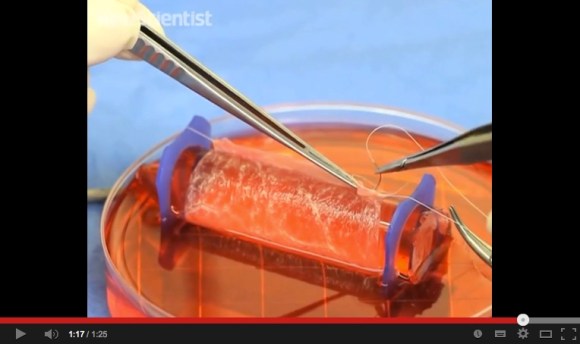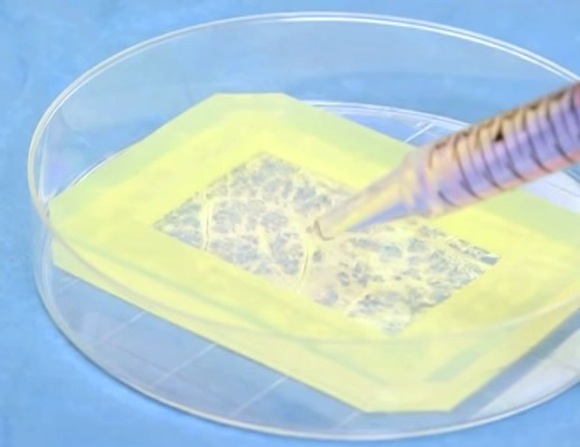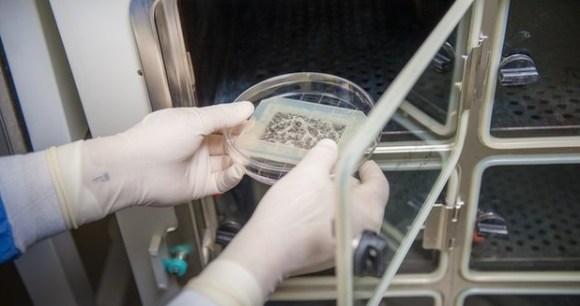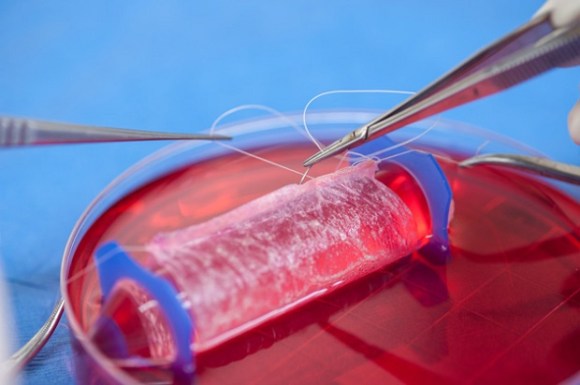
It sounds like the plot of an improbable B-movie. But sometimes the truth is stranger than science fiction. Four women in the US have successfully received implanted vaginas that were grown in a lab from their own cells.
The women, who were all born with a rare condition which means the vagina does not develop properly, underwent the pioneering treatment at Wake Forest School of Medicine, North Carolina. The engineered vaginas, the first to be grown from the patients’ own living tissue and successfully implanted, have made it possible for the women to have sex for the first time.
All four women were born with a severe form of Mayer-Rokitansky-Küster-Hauser Syndrome (MRKH), a condition where the vagina and uterus do not develop properly or are completely absent. Before the operation, the women had a vulva, but no internal vaginal passage; they couldn’t menstruate or have penetrative sex.
Scientists removed tissue from the vulva of each woman, and grew the cells in the lab on a “scaffold”, a stretchy base made of biodegradable collagen:
The growing tissue was then put into an incubator:
Then, the collagen scaffold was hand-stitched into the shape of a vagina:
In the operation, a cavity was created in the women’s abdomen, into which the engineered vaginal scaffold was then implanted. Following the surgery, the inserted tissue successfully matured into the women’s existing tissue over a number of months.
Conventional vaginal construction methods have used skin grafts or tissue from the abdominal tract, but these can have unpleasant side effects. Dr. Atala, Director of the Wake Forest Institute, told the BBC: “Really for the first time we’ve created a whole organ that was never there to start with, it was a challenge.”
Dr. Atala revealed this week that his team performed the first implants eight years ago. Enough time has passed that there seem to be no long-term side-effects, so the results have now been published for the first time.
MRKH is thought to affect around 1 in 5,000 women, and can be challenging psychologically as well as physically. Dr. Atala said the difference the operation had made to the women’s lives “was very rewarding to see”. After the implant, the women were able to have penetrative sex, and in theory, it’s even possible that some of them will be able to have children.
That’s the wonderful thing about the future – it’s not as far away as we think.
Sources: engadget, BBC, New Scientist




 Starbucks Japan unveils new sakura cherry blossom collection for hanami season 2026
Starbucks Japan unveils new sakura cherry blossom collection for hanami season 2026 One Piece creator has hidden secret of anime treasure’s identity in chest at bottom of real-world ocean
One Piece creator has hidden secret of anime treasure’s identity in chest at bottom of real-world ocean Is Tokyo Station’s startlingly expensive wagyu bento boxed lunch worth its high price?[Taste test]
Is Tokyo Station’s startlingly expensive wagyu bento boxed lunch worth its high price?[Taste test] Taste-testing Japan’s real-world Dragon Balls and Senzu Beans at Marugame Seimen
Taste-testing Japan’s real-world Dragon Balls and Senzu Beans at Marugame Seimen Japan’s cherry blossom season predicted to start earlier than we’d thought, especially in Tokyo
Japan’s cherry blossom season predicted to start earlier than we’d thought, especially in Tokyo Starbucks Japan unveils new sakura cherry blossom collection for hanami season 2026
Starbucks Japan unveils new sakura cherry blossom collection for hanami season 2026 One Piece creator has hidden secret of anime treasure’s identity in chest at bottom of real-world ocean
One Piece creator has hidden secret of anime treasure’s identity in chest at bottom of real-world ocean Is Tokyo Station’s startlingly expensive wagyu bento boxed lunch worth its high price?[Taste test]
Is Tokyo Station’s startlingly expensive wagyu bento boxed lunch worth its high price?[Taste test] Taste-testing Japan’s real-world Dragon Balls and Senzu Beans at Marugame Seimen
Taste-testing Japan’s real-world Dragon Balls and Senzu Beans at Marugame Seimen Japan’s cherry blossom season predicted to start earlier than we’d thought, especially in Tokyo
Japan’s cherry blossom season predicted to start earlier than we’d thought, especially in Tokyo Sakuramochi festival sweetens things up at Tokyo’s Seibu Ikebukuro this season
Sakuramochi festival sweetens things up at Tokyo’s Seibu Ikebukuro this season Which Japanese convenience store has the best steamed curry buns?【Taste test】
Which Japanese convenience store has the best steamed curry buns?【Taste test】 The perks of drinking root beer at A&W in Japan
The perks of drinking root beer at A&W in Japan The results are in! One Piece World Top 100 characters chosen in global poll
The results are in! One Piece World Top 100 characters chosen in global poll Fender releases Made in Japan Limited Cyclone with domestically made pickups
Fender releases Made in Japan Limited Cyclone with domestically made pickups Starbucks Japan releases first-ever Hinamatsuri Girls’ Day Frappuccino
Starbucks Japan releases first-ever Hinamatsuri Girls’ Day Frappuccino Japanese restaurant chain serves Dragon Ball donuts and Senzu Beans this spring
Japanese restaurant chain serves Dragon Ball donuts and Senzu Beans this spring Japan Extreme Budget Travel! A trip from Tokyo to Izumo for just 30,000 yen [Part 1]
Japan Extreme Budget Travel! A trip from Tokyo to Izumo for just 30,000 yen [Part 1] Japan’s craziest burger chain takes menchi katsu to new extreme levels
Japan’s craziest burger chain takes menchi katsu to new extreme levels Japan Extreme Budget Travel! A trip from Tokyo to Izumo for just 30,000 yen [Part 2]
Japan Extreme Budget Travel! A trip from Tokyo to Izumo for just 30,000 yen [Part 2] Japanese drugstore sells onigiri at pre-stupid era prices, but how do they compare to 7-Eleven?
Japanese drugstore sells onigiri at pre-stupid era prices, but how do they compare to 7-Eleven? Viral Japanese cheesecake from Osaka has a lesser known rival called Aunt Wanda
Viral Japanese cheesecake from Osaka has a lesser known rival called Aunt Wanda Lawson adds doughnuts to its convenience store sweets range, but are they good enough to go viral?
Lawson adds doughnuts to its convenience store sweets range, but are they good enough to go viral? Japan’s newest Shinkansen has no seats…or passengers [Video]
Japan’s newest Shinkansen has no seats…or passengers [Video] Starbucks Japan releases new sakura goods and drinkware for cherry blossom season 2026
Starbucks Japan releases new sakura goods and drinkware for cherry blossom season 2026 Foreigners accounting for over 80 percent of off-course skiers needing rescue in Japan’s Hokkaido
Foreigners accounting for over 80 percent of off-course skiers needing rescue in Japan’s Hokkaido Super-salty pizza sends six kids to the hospital in Japan, linguistics blamed
Super-salty pizza sends six kids to the hospital in Japan, linguistics blamed Starbucks Japan unveils new sakura Frappuccino for cherry blossom season 2026
Starbucks Japan unveils new sakura Frappuccino for cherry blossom season 2026 Foreign tourists in Japan will get free Shinkansen tickets to promote regional tourism
Foreign tourists in Japan will get free Shinkansen tickets to promote regional tourism The 10 most annoying things foreign tourists do on Japanese trains, according to locals
The 10 most annoying things foreign tourists do on Japanese trains, according to locals Take a trip to Japan’s Dododo Land, the most irritating place on Earth
Take a trip to Japan’s Dododo Land, the most irritating place on Earth Naruto and Converse team up for new line of shinobi sneakers[Photos]
Naruto and Converse team up for new line of shinobi sneakers[Photos] Survey asks foreign tourists what bothered them in Japan, more than half gave same answer
Survey asks foreign tourists what bothered them in Japan, more than half gave same answer Japan’s human washing machines will go on sale to general public, demos to be held in Tokyo
Japan’s human washing machines will go on sale to general public, demos to be held in Tokyo Starbucks Japan releases new drinkware and goods for Valentine’s Day
Starbucks Japan releases new drinkware and goods for Valentine’s Day We deeply regret going into this tunnel on our walk in the mountains of Japan
We deeply regret going into this tunnel on our walk in the mountains of Japan Studio Ghibli releases Kodama forest spirits from Princess Mononoke to light up your home
Studio Ghibli releases Kodama forest spirits from Princess Mononoke to light up your home Major Japanese hotel chain says reservations via overseas booking sites may not be valid
Major Japanese hotel chain says reservations via overseas booking sites may not be valid Put sesame oil in your coffee? Japanese maker says it’s the best way to start your day【Taste test】
Put sesame oil in your coffee? Japanese maker says it’s the best way to start your day【Taste test】 No more using real katana for tourism activities, Japan’s National Police Agency says
No more using real katana for tourism activities, Japan’s National Police Agency says Sakuramochi festival sweetens things up at Tokyo’s Seibu Ikebukuro this season
Sakuramochi festival sweetens things up at Tokyo’s Seibu Ikebukuro this season Which Japanese convenience store has the best steamed curry buns?【Taste test】
Which Japanese convenience store has the best steamed curry buns?【Taste test】 The perks of drinking root beer at A&W in Japan
The perks of drinking root beer at A&W in Japan The results are in! One Piece World Top 100 characters chosen in global poll
The results are in! One Piece World Top 100 characters chosen in global poll Fender releases Made in Japan Limited Cyclone with domestically made pickups
Fender releases Made in Japan Limited Cyclone with domestically made pickups People in Tokyo found over 4 billion yen in lost cash last year and turned it in to the police
People in Tokyo found over 4 billion yen in lost cash last year and turned it in to the police These Japanese cat masks both enchant and terrify
These Japanese cat masks both enchant and terrify This is what a 10,000-yen (US$92) Tokyo bento boxed lunch looks like【Taste test】
This is what a 10,000-yen (US$92) Tokyo bento boxed lunch looks like【Taste test】 Children’s slippers stolen in night at Japanese preschool, police identify weasel who did it【Vid】
Children’s slippers stolen in night at Japanese preschool, police identify weasel who did it【Vid】 J-pop mega star Ado reveals she’s been living in the U.S., may not understand language acquisition
J-pop mega star Ado reveals she’s been living in the U.S., may not understand language acquisition Sakura Japanese Sake KitKats combine rice wine and cherry blossoms for a sweet hanami experience
Sakura Japanese Sake KitKats combine rice wine and cherry blossoms for a sweet hanami experience Visit Kiki’s Bakery at a unique fairytale village in Japan
Visit Kiki’s Bakery at a unique fairytale village in Japan Meet your favorite Sesame Street characters at Krispy Kreme Doughnuts in Japan
Meet your favorite Sesame Street characters at Krispy Kreme Doughnuts in Japan